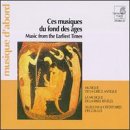| All Artists: Music from the Earliest Times Title: Music From the Earliest Times Members Wishing: 0 Total Copies: 0 Label: Harmonia Mundi Fr. Release Date: 2/9/1999 Album Type: Import Genres: Special Interest, Pop, Classical Styles: Vocal Pop, Opera & Classical Vocal, Chamber Music, Sacred & Religious, Symphonies Number of Discs: 1 SwapaCD Credits: 1 UPC: 794881442522 |
Search - Music from the Earliest Times :: Music From the Earliest Times
 | Music from the Earliest Times Music From the Earliest Times Genres: Special Interest, Pop, Classical
|
Larger Image |
CD Details |
CD ReviewsThree CDs with Music from Earlier Millenia Leslie Richford | Selsingen, Lower Saxony | 03/10/2009 (4 out of 5 stars) "Ces musiques du fond des ages. Music from the Earliest Times. 3 CD box containing:
1. Musique de la Grèce antique (Ancient Greek Music). Fragments and reconstructions. Performed by Atrium Musicae de Madrid, dir. Gregorio Paniagua. Recorded in June 1978, first published as an LP in 1979. Total playing time: 52'39". 2. La Musique de la Bible Révélée (The Music of the Bible Revealed). Texts from the Hebrew Bible as they may have been performed in the Temple at Jerusalem. Reconstructed by Susanne Haik-Vantoura after notations found in Hebrew manuscripts. Performed by Adolphe Attia, tenor; Michel Scherb, barytone; Emile Kacmann, bass; choirs directed by Maurice Benhamou; Martine Géliot, celtic harp; Raymond Cousté, lute; Gérard Perrotin, percussion; Pierre Pollin, trumpet. With Susanne Haik-Vantoura. Recorded in November 1975 and first published as an LP in 1976. Total playing time: 38'40". 3. Alleluias et Offertoires des Gaules (Alleluias and Offertories of the Gauls). Pre-Gregorian chant from the 5th through 9th centuries reconstructed and sung by Iegor Reznikoff. Recorded in 1979 and first released as an LP in 1980. Total playing time: 51'33". These three CDs, re-released in a box in 1999, represent Harmonia Mundi's excursion into the world of truly ancient music. The oldest of the recordings is that made by a group of singers directed by Susanne Haik-Vantoura claiming to represent the music of the Hebrew Bible. It is impossible for me to make any kind of pronouncement on the authenticity of this material, I can only report that the notes claim that old Hebrew manuscripts contain a kind of musical (= vocal) notation which Mme. Haik-Vantoura has managed to decipher and then combined with certain verbal instructions on Hebrew singing to provide reconstructions of what old Hebrew singing might have sounded like in the post-Davidic temple. It seems to me that there are a lot of question-marks hanging over the whole proceedings, but the actual recording is in some respects convincing, although I can imagine that the Hebrews were also capable of a lot more joyful singing than the somewhat sombre chant to be heard here. The performers are obviously influenced to some extent by synagogue traditions. Nonetheless, this is a rare insight into music which had been forgotten for thousands of years. The playing time of merely 38 minutes is very short for a re-release. Gregorio Paniagua's reconstruction of ancient Greek fragments taken from manuscripts and illustrations is apparently quite authentic, and rests on thorough scientific research. Unfortunately, the CD version reproduced here only contains brief notes and no texts at all, making listening an even more perplexing task than it would have been with copious introductions. The music is definitely "weird", and this is not only a consequence of interpreting Greek music as atonal, but also, perhaps, a result of Paniagua's decision to cast his interpretation in a sad mould to reflect his sadness at the lack of surviving Greek music. Obviously, much of what can be heard here is speculative, and the use of percussion, in particular, may not to be everyone's taste. However, the analogue recording is, as with all of Paniagua's discs, absolutely superb, allowing one to hear every detail. Iegor Reznikoff's reconstruction of pre-Gregorian chants from Gaul is a highly subjective, meditative work in Latin. Reznikoff chants the pieces unaccompanied (except possibly for an occasional note that sounds like it could be from a harp) and it requires a good deal of concentration to immerse oneself in these strange-sounding, slow and very religious texts." |

 Track Listings (22) - Disc #1
Track Listings (22) - Disc #1